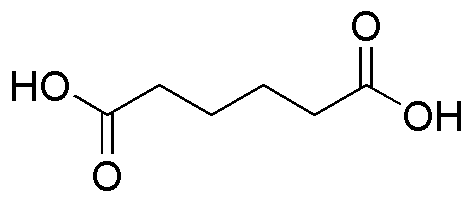Adipic acid is widely utilized in research focused on various applications across multiple industries:
- Polymer Production: Adipic acid is a key ingredient in the manufacture of nylon, particularly nylon 6,6. This application is crucial in the textile and automotive industries, where strong, durable materials are needed.
- Food Industry: It serves as an acidulant and a flavoring agent in food products. Its use helps to enhance flavor profiles and maintain the stability of food items, making it valuable for food manufacturers.
- Pharmaceuticals: In the pharmaceutical sector, adipic acid is used as an excipient in drug formulations. It aids in the stability and release of active ingredients, improving the efficacy of medications.
- Cosmetics: The compound is found in various cosmetic products, where it functions as a pH adjuster and stabilizer. This application is essential for ensuring product safety and effectiveness.
- Biodegradable Plastics: Adipic acid is increasingly being explored for use in the production of biodegradable plastics, which addresses environmental concerns by providing a sustainable alternative to conventional plastics.
General Information
Properties
Safety and Regulations
Applications
Adipic acid is widely utilized in research focused on various applications across multiple industries:
- Polymer Production: Adipic acid is a key ingredient in the manufacture of nylon, particularly nylon 6,6. This application is crucial in the textile and automotive industries, where strong, durable materials are needed.
- Food Industry: It serves as an acidulant and a flavoring agent in food products. Its use helps to enhance flavor profiles and maintain the stability of food items, making it valuable for food manufacturers.
- Pharmaceuticals: In the pharmaceutical sector, adipic acid is used as an excipient in drug formulations. It aids in the stability and release of active ingredients, improving the efficacy of medications.
- Cosmetics: The compound is found in various cosmetic products, where it functions as a pH adjuster and stabilizer. This application is essential for ensuring product safety and effectiveness.
- Biodegradable Plastics: Adipic acid is increasingly being explored for use in the production of biodegradable plastics, which addresses environmental concerns by providing a sustainable alternative to conventional plastics.
Documents
Safety Data Sheets (SDS)
The SDS provides comprehensive safety information on handling, storage, and disposal of the product.
Product Specification (PS)
The PS provides a comprehensive breakdown of the product’s properties, including chemical composition, physical state, purity, and storage requirements. It also details acceptable quality ranges and the product's intended applications.
Certificates of Analysis (COA)
Search for Certificates of Analysis (COA) by entering the products Lot Number. Lot and Batch Numbers can be found on a product’s label following the words ‘Lot’ or ‘Batch’.
*Catalog Number
*Lot Number
Certificates Of Origin (COO)
This COO confirms the country where the product was manufactured, and also details the materials and components used in it and whether it is derived from natural, synthetic, or other specific sources. This certificate may be required for customs, trade, and regulatory compliance.
*Catalog Number
*Lot Number
Safety Data Sheets (SDS)
The SDS provides comprehensive safety information on handling, storage, and disposal of the product.
DownloadProduct Specification (PS)
The PS provides a comprehensive breakdown of the product’s properties, including chemical composition, physical state, purity, and storage requirements. It also details acceptable quality ranges and the product's intended applications.
DownloadCertificates of Analysis (COA)
Search for Certificates of Analysis (COA) by entering the products Lot Number. Lot and Batch Numbers can be found on a product’s label following the words ‘Lot’ or ‘Batch’.
*Catalog Number
*Lot Number
Certificates Of Origin (COO)
This COO confirms the country where the product was manufactured, and also details the materials and components used in it and whether it is derived from natural, synthetic, or other specific sources. This certificate may be required for customs, trade, and regulatory compliance.

